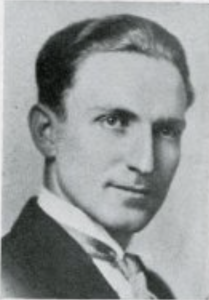
Photo info ...
Credit: The Indiana Album: Joan Hostetler CollectionView Source
(Feb. 27, 1898-Apr. 15, 1976). Born in Pardeeville, Wisconsin, to a third-generation minister, Gerald Lyman Kenneth Smith rose from poverty to become, in H. L. Mencken’s words, “the greatest rabble-rouser since Saint Paul.” While a student of biblical history and rhetoric at Valparaiso University from 1915-1917, he began preaching in Gary and Deep River, Indiana. A mellifluous voice and dramatic gesturing became hallmarks of his style.
Smith’s sermon at a 1922 St. Louis ministerial convention prompted his call to become pastor of the Seventh Christian Church in Indianapolis, effective January 1, 1924. His energetic evangelism quickly transformed the church, increasing membership by 1,150 in two-and-a-half years. He also became president of the Marion County Sunday School Union. In September 1926, Smith assumed the pulpit of the University Place Christian Church, quadrupling its membership. He emphasized work among Butler University students.
Smith intended to remain in Indianapolis, but his wife contracted tuberculosis, forcing their relocation to the milder climate of Shreveport, Louisiana, in 1929. There, he left the ministry for politics, becoming chief organizer for Senator Huey Long’s Share Our Wealth movement. Smith’s association with Long angered Disciples of Christ officials. He resigned before the church fired him.
After Long was assassinated in September 1935, Smith fell into the fold of Francis E. Townsend, a retired physician who proposed a plan that would provide pensions to older Americans to ease the Great Depression.
Despite his association with liberal political factions, Smith turned to anti-Semitic and fascist movements. He established several organizations that were anti-Semitic and that fought against communism, liberalism, and organized labor, including the Committee of One Million and the Christian Nationalist Crusade, the America First Party, and the Christian Nationalist Party. He published the , described as “a reactionary hate sheet.” Smith ran unsuccessfully for the U.S. Senate and for president. By 1956, when he made his last bid for the presidency, his following largely only included members of the far-right fringe.
Smith moved to Eureka Springs, Arkansas, in 1964, where he initiated his Sacred Projects including an anti-Semitic Passion Play that attracted almost 200,000 attendees by 1975. While the Eureka Springs projects gave Smith some respectability by reviving the city as a tourist attraction, his legacy overall is negative—one of anti-Semitism and hate.

Help improve this entry
Contribute information, offer corrections, suggest images.
You can also recommend new entries related to this topic.